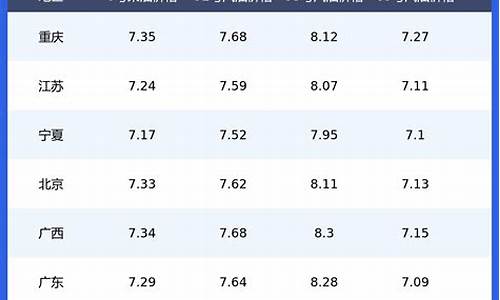燃油价格 英语-油价英语是复数吗

从一开始就在关注这个问题,一直不敢上贴。怀着学习探究的态度,认真结合楼下两位的分析,并查阅相关语法书籍之后,结论是:
全句是强调句式,强调主语,结构是:主谓宾宾补
现在来说说我的分析:
1、此句总体结构是强调句,并省略了关系代词that (没见过可省that? 请见后面的引证)
全句主干是:
It's + 被强调部分 + (that) are causing South-East Asia's largest economy stiff price rises
less than a year before an election.
被强调部分(a measure of pain fuel subsidies名词短语作主语),去掉强调后主干是:
[A measure of pain fuel subsidies] [are causing] [South-East Asia's largest economy]
[stiff price rises less than a year before an election.]
2、去掉强调后,句子结构是
主语:A measure of pain fuel subsidies
谓语:are causing
宾语:South-East Asia's largest economy
(以上主谓宾分析与201104yangyang相同,对宾补我有不同看法:)
宾补:stiff price rises less than a year before an election
即我认为那个"to"并不含在宾补中,而是跟在agreed后一并归为定从当中。
为什么这么分?
(1)英语当中有:cause sb. sth.的用法。如:My car has caused me a lot of trouble.
我的汽车给我带来很多麻烦(引自《牛津高阶英汉双解词典 》,下称牛津)
(2)请注意stiff price rises,一个是stiff,另一个是rises(注意有s)
牛津中stiff一词有诸多词性:adj. adv. noun. verb.,
但作verb.时意思只有:";不还钱;不给小费",不符合语境
另外,stiff本身应另有动词形式:stiffen
以上是为了说明此处的stiff不是动词,我认为是形容词adj.
而rises不是动词加s,而是名词复数。stiff price rises只是一个名词短语。
(3)所以全句应该是 sth .cause sb. sth. 的结构。
3.、定语从句:that the president, Susilo Bambang Yudhoyono, and legislators have agreed to
先行词: economy(此处指“印度尼西亚”)
由上条分析可知,此时即不存在定从中少to/on的问题了。
例句:The committee has agreed to his arrangement.委员会已同意了他的安排。
(来源:英语常用短语词典)
以上是这个句式的语法和逻辑分析。
强调句可以省略that?
以前未见过强调句可以省that,所以拿不太准,为此,专门查了一下有关权威语法书籍,结论是:在非正式语体中有时是可以省略的。下面我简单摘录一下相关证据:
“要知道,在非正式语体中,在强调句中不仅可以省略充当宾语的关系代词,而且也可以省略充当主语的关系代词或充当状语的关系副词:It was at the dance (that) John wore a white suit last night.”(CGEL)" -------《英语常见问题解答大词典》赵振才著,296页。
“(6) I suspected it was on her orders you were bringing him here.强调结构中的that与who在非正式文体中可以省略,如上述例(6)”-----《高级英语语法》薄冰著,569页。
为什么month的复数是加s而不是加es
英语any disruption的意思是:任何干扰。
重点词汇:disruption
n. 扰乱,中断
短语
cell disruption?细胞破碎 ; 翻译 ; 细胞破壁
Market Disruption?市场扰乱 ; 市场干扰 ; 市场瓦解 ;?[贸易]?市场混乱
environmental disruption?[环境]?环境破坏 ; 环境破裂 ; 环境的破坏 ; 环境污染
双语例句
The?disruption?of?European?trade?during?the?war?had thrown the?economy?into?a?tailspin.?
战争期间欧洲贸易的中断使经济陷入一片困境。
高三英语Unit1课后答案
1、一般名词复数是在名词后面直接加上“s”,如map→maps, bag→bags等。
2、以s, sh, ch, x等结尾的词加“es”,如bus→buses, watch→watches等。
month的英式读法是[m?nθ];美式读法是[m?nθ]。
单词直接源自古英语的monath,意为月。
相关例句:
1、He shut himself away for a month to catch up on his academic work.
他与世隔绝一个月,力图把功课赶上去。
2、He's asking 80 a month rent for that flat.
那套房间月租他要80英镑。
扩展资料:
一、单词用法
n.(名词)
1、month是可数名词,基本意思是“月”“月份”,还可指“一个月”,大约四个星期的时间。
2、表示“在某月份”时常用介词in,但当month前有every, each, next, any, all, last, this, that等修饰时,介词in一般要省略。
3、month是指时间的可数名词,而一年中每月份的名称是专用名称,第一个字母要大写。
4、表示“在?个月(时间)内”时,介词用within或in,不过,在美国口语中in还有“在?(个月)时间后”的意思。
5、month用作定语从句的先行词时,关系词that〔when〕常省略。
6、当以现在为时间参照点时, next?month前不带冠词; 当以过去某时间为时间参照点时, next?month前既可带定冠词,也可不带定冠词。
二、词义辨析
n.(名词)
next month, following month
这两个短语都可译为“下月”,其区别是:
1、next month可指以现在为时间参照点,也可指以过去某时间为参照点。
2、而following month仅指以过去某时间为参照点。在直接引语改为间接引语时,next month通常改为following month。
recession是什么意思
6月29日 15:23 教版高三英语同步教案Unit 16 Finding jobs
一. Word study
1.adviser n.. 顾问 a financial ~ 财务顾问
v. advise ~ sb against sth. / doing sth.
I would ~ against going out on your own. 我劝告你别单独外出。
~ that ( should do )
They ~ that a passport be carried with you at all times.他们建议护照要随身携带。
~ sb. on sth. We employ an expert to ~ on new technology.
我们聘用一位专家作新技术顾问。
2 trainee n. 受训练的人 动词加后缀ee表示“人” employee雇员
examinee 应试者, 考生 trustee 委托人 addressee 受信人 refugee 难民, 逃难者
absentee 缺席者
3. adore v. 热爱, 敬爱 可接名词,代词,动名词。没有进行时态。
She adores good books and the theatre. 她很喜欢读好书和看戏。
They adore going to volleyball matches.他们喜欢看排球比赛。
a. adoring 崇拜的, 敬意的
He gave her an adoring look. 他向她投以爱慕的目光。
She refused to play the part of the blindly adoring wife.她不愿当个盲目崇拜丈夫的老婆。
She looked at him with adoring eyes. 她用崇敬的目光看着他。
adore 表示极度尊敬和爱慕 adore sb for sth 在某方面崇敬某人
The villagers all adored him for his generosity.
respect 表示一般的尊敬
4. vacant 未专用的, 空着的 ~ properties 未专用的房地产
空缺的 When the post finally became ~, they offered it to Kate.
这个职位最终空出来以后,他们给了凯特。
无神的, 呆滞的 a ~ look/ stare 呆滞的目光, 木然的凝视
adv. vacantly
5. outstanding 优秀的, 杰出的 an ~ player/ achievement 杰出的运动员/ 成绩
明显的, 重要的 the ~ features of the landscape 这一风景的突出特征
未支付的, 未解决的 She has ~ debts of over $500.
她拖欠的债务超过500美元。
A lot of work is still ~. 许多工作尚未完成。
adv. outstandingly 极其, 非常 ~ successful 非常成功
优异, 极好 He performed well but not ~.他表演得很好, 但算不上完美。
6. assess 评价, 测定 He can quickly assess a person’s character.
他对一个人的性格能很快作出评价。
Sometimes it’s not easy to assess the political situation.
有时政治形势不容易判断。
估计……的价值或数量 They assessed the value of the house at $ 250,000.
他们估计房子的价值在二十五万美元。
7. salary 一般按月计算,常直接拨入领取者的银行户头。
The company is offering a salary of $30.000 per year. 那家公司招聘职员,年薪三万。
income 一个人或单位所得的收入, 不仅限于工资。
a family with two incomes 有双份收入的家庭
pay 一般指雇主定期付给的工资 pay-day 每星期或每月领取工资的日子。
He doesn’t like the job, but the pay is good.
wages 一般指按星期或按日发放的工资, 通常为现款, 一般按小时,日,星期计算。
We expect a fair day’s wage for a fair day’s work.
我们做好一天的工作,就希望得到一天应得的工资。
fee 指付给律师,医生等的报酬。 pay the lawyer’s fee
8. personnel “员工 ”“人员”的总称, 通常指收雇人员的整体, 是集体名词, 作主语时, 谓语动词词用单数或复数均可。
The ~ are unhappy about these changes. 全体成员对这些改变感到不快。
personnel 前可用数词修饰We have 100 personnel employed on the site. 这个场地上我们有一百个雇员。
personnel 可作定语,“管人事的”He is a ~ officer. 他是一名人事管理人员。
Please report to the ~ department tomorrow.明天请到人事处报到。
personal “个人的”, “私人的”
That’s just my personal opinion.
She has no personal ambition. 她没有个人野心。
In his personal life, he was a good-natured kind man.
在私人生活上, 他是个天性善良和蔼可亲的人。
9. addition 增加的人或事物 the latest ~ to our range of cars 我们汽车系列新增加的款式。
加法 children learning ~ and subtraction 学习加减的儿童
增加; 添加 Pasta’s basic ingredients are flour and water, sometimes with the addition of eggs
or oil. 意大利面制品的主要成分是面粉和水, 有时加鸡蛋或食用油。
in addition ( to sb./ sth. ) 除``````以外
In addition to these arrangements, extra ambulances will be on duty until midnight.
除了这些安排以外, 另增救护车值班至午夜。
二.Language Points
1.accomplish 通常接 task, aim, journey, voyage 等名词
The explorers accomplished the voyage in five weeks. 探险队在五周内完成了航程。
complete 比accomplish具体,可接建筑,工程, 书籍等名词, 指“按预期目的把未完成的工作经经过进一步的努力使之完成”
The building will be completed by the end of this month.
finish 在许多情况下可与complete换用, 但不及complete正式
I have to finish writing the book by this weekend.
2. offer 提出, 提供 offer sb. sth..
The young man offered the old man his seat.
I must offer them an apology for not going to attend their get-together.
我没去参加他们的聚会,必须想他们表示歉意。
He offered me 300 dollars for that television. 他出三百美元买我那部电视机。
offer to do sth. 愿意做某事
They offered to help us.
I have been offered a large sum of money to go away, but I am determined to stay here.
有人曾向我提供一大笔钱让我走,但我决心留在这里。
offer n. “提供,提议” Thank you for your offer of help. 谢谢你提供帮助。
3. count 起作用, 有价值
Every vote counts in an election. 在选举中每一张选票都起作用。
What really counts is not what you say but what you do.
A baby’s promise counts for nothing. 娃娃的诺言是不算数的。
认为, 视为,与 as , for, against 连用
He said that he counted me as his dearest person.
I count myself lucky to be here with you.我认为与你在一起很幸福。
数, 计数
Count how many apples are in this box.
After the votes are counted, the election result will be made public.
选票数点过之后, 就公布选举结果。
4. do with 处理, 处置
I don’t know what is to be done with it. 我不知道这件事该怎么处理。
The boys didn’t know what to do with themselves when school ended.
与``````有关
I am interested in anything to do with music.
The rise in prices all has something to do with the increased cost of oil.
物价上涨都与油价升高有关。
5. hold back 踌躇, 退缩不前
Because of the uncertain state of the market, buyers are holding back.
由于市场不稳定状态, 买主们都踌躇不前。
阻止, 抑制
Jim was able hold back his anger and avoid a fight.
They built banks of earth to hold back the rising flood waters.
他们修筑堤坝来阻挡上涨的洪水。
They are accustomed to holding back their emotions.
隐瞒, 扣留
We were sure he was holding something back from us.
We must have the whole story; don’t hold anything back.
我们必须了解全部情况,你什么也不要隐瞒。
6. appealing 有趣的, 吸引人的
a very ~ idea 一个有趣的想法 an ~ smile 迷人的微笑
She does look ~ in the dress. 她穿着那件裙子确实很有魅力。
She looked at him with ~ eyes. 她以有感染力的目光注视着他。
appeal v. 恳求, 请求 appeal to sb. for sth.
I shall appeal to him for further information.
They appealed to him to give up the idea.
投合``````的心意
Bright colours appeal to small children.
小孩子喜欢鲜亮的颜色.
求助于
To increase its vote, the party must appeal to the farmers.
要想增加选票, 这个党必须求助于农民.
三. Useful phrases.
1. 足球狂 football crazy
2. 日益增多的 an increasing number of
3. 职业足球运动员 a professional football player
4. 踢球进分 score a goal
5. 红魔高级队 the Red Devils’ senior team
6. 不同寻常的事业 an extraordinary career
7. 中场球员 a mid-field player
8. 达到目的 accomplish one’s aim
9. 具有特殊素质 with particular qualities
10. 具有极好的控球能力 have excellent ball control
11. 具有良好的团队精神 have good team spirit
12. 精神动力 mental strength
13.安排计划 set up programmes
14. 正规的教育 a formal education
15. 领薪水的职员 a paid member of staff
16. 打扫更衣室 clean the changing room
17. 办公室管理 office administration
18. 从此以后 from this point of on
19. 竞争激烈的行业 a fiercely competitive occupation
20 具有相同的梦想 with the same wish
21. 有机会做某事 have an opportunity to do sth.
22. 申请表 application forms
23. 以一般的方式 in a general way
24. 个人情况说明 a personal statement
25. 胜任这项工作 be good at the job
26. 个人特点 personal characteristics
27. 他们公司的一个新生力量 a great addition to their company
28. 形成好印象 make a good impression
29. 产生积极效果 create a positive effect
30. 拿出证据 give evidence of
31. 吸引人的消息 appealing information
32. 避免一般化 aviod being too general
英语中的“I”是什么词性?
recession ,英语单词,可作为名词。
1、名词:衰退;不景气;后退;凹处;
2、单词变形:复数 recessions;
3、音标:英/r?se?n/? 美/r?se?n/;
4、例句:But recession and the competition for jobs could alter that.?
但是衰退和工作的竞争可能会改变这一点。
扩展资料
1、同近义词
n.衰退;不景气;后退;凹处
depression、downturn、decline、cavity
2、例句
But revenues and profits continue to fall, and not just because of the recession.?
但它们的收益和利润继续下降,并且不只是因为处在衰退期。
3、同根词
词根:recess
adj.
recessive 隐性的;逆行的;后退的
recessionary (经济)衰退的;衰退期的
recessional 后退的;(英)议会休会的
n.
recess 休息;休会;凹处
recessive 隐性性状
参考资料
百度百科-recession
英文how muhch pnice是什么意思
I是人称代词的主格形式。
一、人称代词的定义。
人称代词表示人称范畴以及它们的屈折变化形式,有人称、性、数与格之分。
二、人称代词的用法。
顾名思义,人称代词表示人。然而,人称代词并不全指人,也指物。人称代词有三个人称,每个人称又分单数和复数(第二人称单数与复数同形),第三人称单数还有阳性、阴性和中性之分。人称代词的人称、数和性取决于它所指代的名词,而人称代词的格则取决于它在句中的地位。
1. 第一人称代词。
第一人称单数I代表说话者,须大写。如:
I beg your pardon, Is this your handbag? 对不起,这是你的手提袋吗?
That’s what I mean. 那就是我的意思。
第一人称复数we代表说话者一方(二人或二人以上)。如:
We walked together up the garden path. 我们一道沿着园中小径漫步。
We need one more telephone. 我们还需要一部电话机。
we有时也包括听话者。如:
Shall we call a taxi? 咱们叫一部出租车好吗?
Let’s go, shall we? 咱们走吧,行吗?
we可以代表一个集体。如:
We should like to duplicate the order we sent you last month. 我们想复制一份上月给你们的订单。( we代表公司或政府)
We do not necessarily support the views expressed in this column. 我们并不一定赞同这一栏目中所表达的观点。 ( we代表报纸)
We wish to record our special thanks to R. A. Close for his detailed work revising the manuscripts. 我们特别感谢R. A. 克劳斯对本书手稿所作的详细校定。(we代表著者)
We也可以用来泛指大家。如:
We all fear the unknown. 对于未知的事物我们都感动害怕。
We all get into trouble sometimes. 我们有时都会遇到麻烦。
2. 第二人称代词。
第二人称单、复数you代表听话者或对方(复数you代表二或二人以上)。如:
“Whatever you want you shall have,” said the Fairy. “你要什么就会有什么,”仙女说。
I choose you three; the rest of you can stay here. 我选你们三个,其佘的可以留在这里。
you究竟是表示单数或复数,往往要根据句意和语境来确定。如:
Are you ready, David? 戴维,你准备好了吗?(you表单数)
You must both come over some evening. 你们俩必须找个晚上过来一趟。(you表复数)
you也可以用来泛指大家。如:
You never know what may happen. 谁也不知道会发生什么事。
World trade is improving, but you cannot expect miracles. 世界贸易正在改善,但谁也不能期望出现奇迹。
You should do your best at all times. 你无论何时都应尽你的最大努力。
3. 第三人称代词。
第三人称单数阳性he代表已提到过的男人。如:
He is a powerful man. 他是个有权势的人物。
Where’s John? ——He’s gone to the cinema. 约翰在哪里?——他看**去了。
在一些谚语中he可以泛指大家。如:
He who hesitates is lost. 当断不断,必受其患。
He who laughs last laughs best. 谁笑到最后,谁笑到最好。
第三人称单数阴性she代表已提到过的女人。如:
Where is Charlotte? ——She’s outside sunbathing. 夏洛特在哪里?——她在外边晒太阳。
She had a lively sense of humor. 她有一种很强的幽默感。
第三人称单数中性it代表已提到过的一件事物。如:
That vase is valuable. It’s more than 200 years old. 那个花瓶很珍贵,它有200多年的历史。
I love swimming . It’s keeps me fit. 我喜欢游泳,它能使我保持健康。
You have saved my life; I shall never forget it. 你救了我的命,我将永生不忘。
当说话者不清楚或无必须知道说话对象的性别时,也可以用it来表示。如:
It’s a lovely baby. Is it a boy or girl? 宝宝真可爱,是男孩还是女孩?
it用来指代团体。如:
The committee has met and it has rejected the proposal. 委员会已开过会,拒绝了这项建议。
it常用来指代时间、距离、自然现象等。如:
It is half past three now. 现在是三点钟。
It is six miles to the nearest hospital from here. 这里离最近的医院也有六英里。
It was very cold in the room. 房间里很冷。
it有时非确指。如:
How’s it going with you? 你近况如何?
Take it easy. 不要紧张。
it还常用于固定习语,it所指为对方所熟知,故无必要明确指出。如:
cab it 乘车
come it 尽自己分内
walk it 步行
come it strong 做得过分
make it 办成
take it out of somebody 拿某人出气
第三人称复数they(不分性别)代表已提到过的一些人或事物。如:
John and Susan phoned. They’re coming round this evening. 约翰和苏珊来了电话,他们今晚要来。
Where are the plates? ——They are in the cupboard. 盘碟在哪儿?——在碗橱里。
Our curtains look dirty. They need a good wash. 我们的窗帘看来很脏了,需要好好洗一洗。
they也可以用于一般陈述,泛指“人们”。如:
They say that honesty is the best policy. 人们说诚实是上策。(they泛指人们)
One of the best ways of seeing London, they used to say, is from the top of a bus. 过去人们常说,从公共汽车顶上看伦敦,是最好方法之一。(they泛指人们)
they常用来指“当局”等。如:
They ‘re putting up oil prices again soon. 当局即将再次提高油价。
4. 人称代词的指代。
人称代词一般出现在它所指代的名词之后,但有时也出现在它所指代的名词之前。如:
Though he did not know it, Jerome was now close to the sea and was padding in a new kind of river. 杰罗姆还不知道,其实他这时已接近大海,正在一条新河中划着船。
They tremble — the sustaining crags. 它们颤动了——这些支撑着的岩石。
第三人称代词在句中一般指代离它最近的名词或代词。如:
He reminded his friend that he must come back before five clocks. 他提醒他的朋友务必五时前回来。
The butler knew and welcomed him. He was subjected to no stage of delay. 管家认得并欢迎了他;他是不容有一点怠慢的。
但有时不明确,需要从上下文去判断。如:
Tom wasn’t going to tell George the truth as he was supposed to do. 汤姆决定不告诉乔治实情,虽然他应该这样做。(这里的he显然代表Tom,不代表George)
Wu Da could not help seeing that Zhang treated his wife as though she belonged to him, but he was not in a position to object. 武大眼看张某待其妻就像他的一样,但却无可奈何。(him自然指张某,但却指he武大)
5. 人称代词的拟人化。
人称代词有时有拟人化的作用,即用it指代的事物改用he或she以及相应的物主代词或反身代词指代。如:
The emigrants embarked in a little ship. She probably leaked copiously. 移民们上了一只小船,那船可能漏得厉害。
The aircraft moved slowly forward‥‥she became airborne‥‥and she rose clean as a swallow. 飞机慢慢向前移动‥‥它起飞了,它完全像一只燕子起飞了。
A fox snuck along the side of the hedge. “There he goes,” said Mr. Long. 一只狐狸沿着篱笆潜行。“他跑了,”朗先生说。
英语Power-ups to boost you upward怎么翻译?
英文how muhch pnice,原句应该是:how muhch price?本意是询问价格,但不合语法。英语中询问价格通常有以下几种:
1、最地道的问价格方法就是:How much
例如:How much is it?它多少钱?
How much are they?它们多少钱?
2、还可以说:What's the price of it?它的价格是多少?
或者:I wonder its price.我想知道它的价格.
或者:May I know its price?我可以知道它的价格吗?
price 英 [ pra?s ] 美 [ pra?s ]
n.价格,价钱 代价 价值 赏金
vt.标价 定价 问…的价格 给…定价
复数: prices 过去式: priced 过去分词: priced 现在分词:pricing 第三人称单数: prices
1.The price of oil should remain stable for the rest of 1992.
油价会在1992年剩下的时间里保持稳定。
2.There are intangible benefits beyond a rise in the share price.
除股价上升之外还有无形利益。
英语Power-ups to boost you upward翻译成中文是:“给自己通电,让自己更上一层楼”。
重点词汇:boost
单词音标:英?[bu?st]?美?[bu?st]
单词释义:
v.?提高;增加;鼓励;举起;为...做宣传
n.?增加;推进;鼓励
词形变化:
动词过去式:?boosted
动词过去分词:?boosted
动词现在分词:?boosting
动词第三人称单数:?boosts
复数:?boosts
短语搭配:
boost price?提高价格
boost spirit?激励士气
boost up?托起,支援
give a boost?托一把
big boost?巨大的促进
great boost?巨大的促进
词义辨析:
lift,hoist,raise,elevate,heave,boost这些动词均有“升起、举起”之意。
lift指用人力或机械力把某物升到较高的位置。
hoist多指用绳索、滑轮等机械把重物升起。
raise较正式用词,常可与lift换用,但强调把某物举起或抬起到应有的高度。常用比喻。
elevate较正式用词,指位置、高度的升高,多作比喻用,指职位、品德等的提高。
heave指需花大力气或借外力才能举起或抬起重物。
boost原义指从后面或下面推起或提高,现常用于指提高价格、振作精神等抽象概念。
双语例句:
They're?putting?up?new?hotels?in?order?to?boost?tourism?in?the?area.?
他们正在盖新旅馆以促进该地区的旅游业。
Economic?theory?suggests?that?the?devalued?pound?will?boost?the?economy.?
经济学理论指出贬值的英镑将会促进经济的发展。
The?tax?cuts?will?give?a?much?needed?boost?to?the?economy.?
减税将给经济带来迫切需要的推动力。
Tax?cuts?will?boost?consumer?confidence?after?the?recession.?
减税将增强消费者在经济衰退后的信心。
声明:本站所有文章资源内容,如无特殊说明或标注,均为采集网络资源。如若本站内容侵犯了原著者的合法权益,可联系本站删除。












